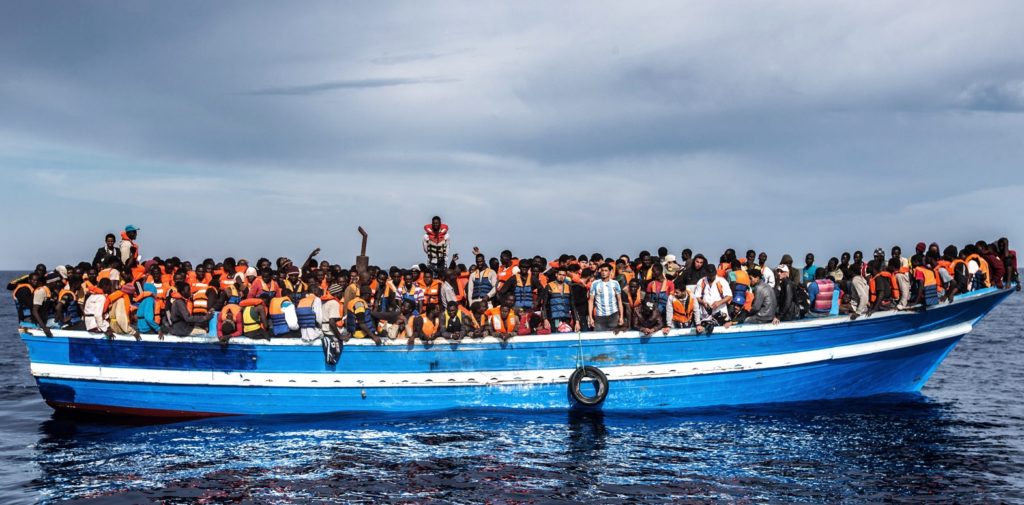
After the far-right government of Italy refused to allow some 629 refugees and migrants mostly from sub-Saharan Africa to land in Italy last week, Spain finally accepted the boat. The crisis dramatically highlighted how the flow of migration from Africa has produced confused responses from the European Union.
Of the passengers on the Aquarius, the boat carrying the refugees and migrants, seven were pregnant women, 11 were children, and 123 were unaccompanied minors. They had originally been rescued off the coast of Libya or transferred to the Aquarius from Italian navel units which had first picked them up. Under traditional maritime law, people in danger at sea should be welcomed at the nearest port. However, the new and anti-immigration Italian Minister of the Interior argued that since they were on the Aquarius they were no longer in danger. Therefore, Italy refused to accept them.
On June 5, representatives from the Interior Ministries of the European Union states met to try to work out a common policy toward refugees and migrants. It is an issue that the EU states have faced with frequency at least since 2014 when, in addition to refugees from Syria and Iraq trying to escape armed violence, the EU welcomed “economic” and “climate change refugees” many from Africa.
There have been a number of EU governmental policies in efforts to cope with the issue. An early policy included funds to help Turkey, Lebanon, and Jordan – nations which hosted the bulk of the refugees from the fighting in Syria and Iraq. Most of the Syrian and Iraqi refugees are still in the three countries, often marginalized and facing grim futures. Under such circumstances, refugees increasingly moved toward Western Europe where economic prospects were better.
As part of procedures concerning earlier and much smaller refugee movements, the EU had drawn up the “Dublin rules” – named after the city in which they were approved. The Dublin rules stipulate that it is in the first EU state reached by the refugee that the refugee must be processed. In practice this has placed a burden on Greece and Italy where many of the refugees from Africa and the Middle East first landed. The facilities of these two governments were inadequate to do the processing. Many refugees tried to move on to other countries without having been processed, often heading to Germany and France where economic conditions are relatively favorable.
The European Commission tried to introduce a system of refugee “quotas.” Each of the then 28 EU states were assigned a certain number of refugees based on their population, economic status, and a few other criteria. The quota system has never worked as envisioned. Certain EU states, especially those of Eastern Europe, refused the idea of quotas entirely. In fact, they tried to refuse having any refugees at all. Other EU states did not refuse publicly but in practice took in many less than the quota goals stipulated.
Since 2015, and in some countries before, anti-immigration sentiments have been rising within certain political parties. These political currents have grown in strength and are now major political factors.
The recent elections in Italy have brought a coalition government to power, and while the two leading parties disagree on a number of fundamental issues, they both agree that there are too many refugees and migrants in Italy, and that a good number should go away or be deported.
With this as background, the Aquarius events take on their symbolic character. The Aquarius is jointly operated by Doctors Without Borders (MSF) and SOS Mediterranée, a human rights rescue mission focusing on migrants traversing the Mediterranean. MSF was founded largely by French doctors who had been in Biafra during the Biafra-Nigeria civil war and who had seen first-hand the suffering of people, especially children, in armed conflict situations. Much of its work is carried out by doctors who can give short-time volunteer efforts such as during vacation periods. SOS Mediterranée has been created more recently as a European non-governmental response to the large number of people trying to reach Europe across the Mediterranean, often in over-crowed and inappropriate boats.
Many of the sub-Saharan Africans migrating north try to reach Europe by first crossing Libya, a country in the midst of ongoing turmoil. Some of the EU states hope that Libya will be able to stop migrants from going further north, and have given funds to increase the Libyan coast guard and to develop “retention camps.” Since Libya has a good number of social and political problems of its own, the idea of an EU-supported “Libyan solution” to the migration flow is unrealistic.
The crisis facing refugees and migrants is rapidly developing, while anti-immigrant politicians and their followers are on the rise. The need for humanitarian action is urgent.
Mathilde Auvillain of SOS Mediteranee, who volunteered on the Aquarius, criticized the “shameful dispute” among European politicians regarding the refugees and migrants on the boat.
“What these people need is safety,” Auvillain said. “They need protection and what are we talking about? Delaying protection? What’s the point?”
Rene Wadlow is President of the Association of World Citizens.
